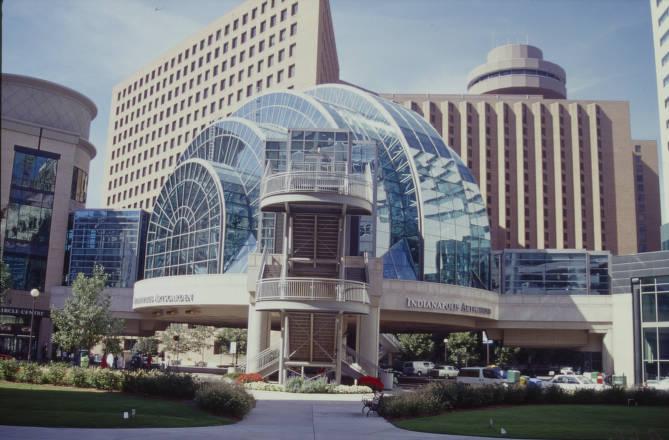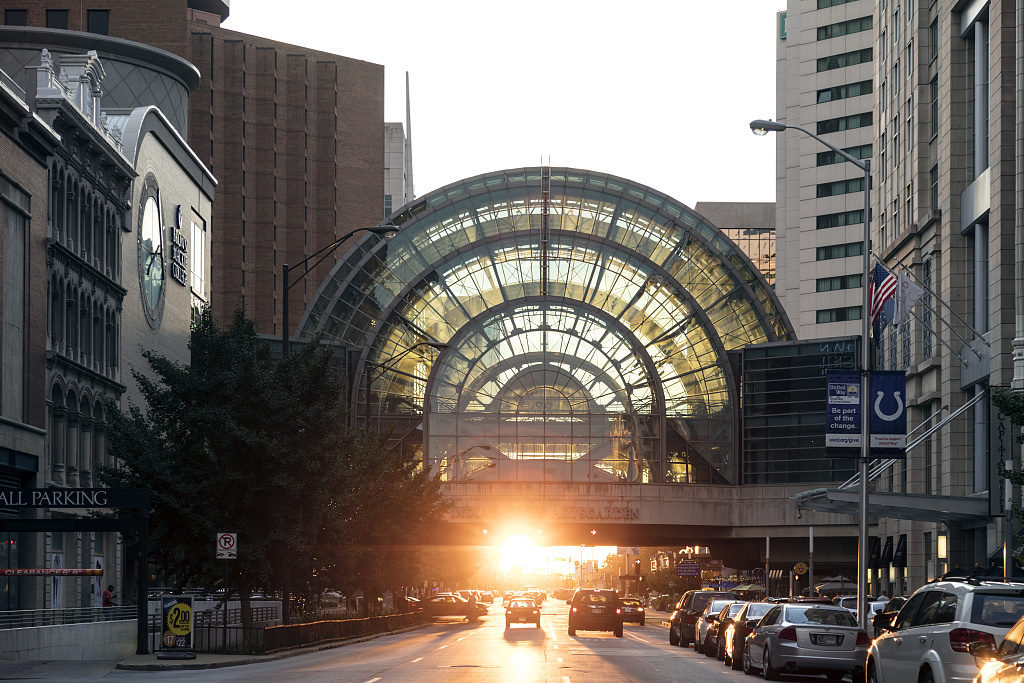Spanning Washington Street at Illinois Avenue, the Artsgarden is both a signature architectural element of a revitalized downtown and a public space devoted to public art.

The geodesic domed glass design of the Indianapolis Artsgarden is a prime example of American architect Buckminster Fuller’s architectural concept of doing more with less. Rising seven stories above the intersection of Washington and Illinois streets, the hemispherical thin-shell structure is an iconic element in the heart of the . Though the Artsgarden may appear like a “fragile nest” hovering perilously above the busy intersection, the triangular-shaped glass dome is rigid enough to withstand substantial heavy loads.
The owns and operates the Artsgarden, which is a piece of art unto itself. International architectural firm Ehrenkrantz Eckstut & Kuhn, designers of , developed the blueprint for the Artsgarden. Blackburn Architects, the firm of Indianapolis architect , collaborated on the plan and execution. The funded the $12 million project.
The floor of the Artsgarden stands 17 feet above the intersection below. A series of arched steel trusses create a graduated set of glass vaults, the tallest stands 75 feet above the floor and 95 feet above the street. A total of 32,000 square feet of glass gives the Artsgarden an open airy feel. The entire dome sits on two pairs of 185-foot plate girders that diagonally span the intersection.
The structure serves as a destination for the arts and culture in downtown Indianapolis as well as a connector between Circle Centre Mall and nearby buildings. A display and performance hall for artists and musicians resides under the dome. More than 250 free and public performances are presented in the space each year. Visual arts exhibitions that showcase the work of central Indiana artists fill the space on a monthly basis. The Artsgarden hosts numerous private events including weddings, corporate receptions, and nonprofits events that support the funding for public arts programming.

Beyond the arts and culture experiences under the polyhedron dome, the Artsgarden includes walkways that connect to adjacent buildings. Constructed in 1995, the Artsgarden initially connected the second level of Circle Centre Mall on the southeast corner of the intersection to the upper level of the -owned Claypool Courts (which stands at the location of the demolished historic ) on the northwest corner.
Stairways make the ground-level sidewalks on the northeast and southwest corners of the intersection easily accessible. In 2006, the Conrad Hotel was built on the northeast corner. A direct connection to the Artsgarden replaced the stairway. Construction on another connector began in 2011. This one linked the Artsgarden to the 16-story on the southwest corner. This final link, completed in 2012, fulfilled the original concept of hitching the Artsgarden to buildings on all four corners.
The cultural concierge staff assists visitors with event information, calendars, reservations, directions, and any other arts and culture questions. These services are available during regular Circle Centre Mall operating hours.

Help improve this entry
Contribute information, offer corrections, suggest images.
You can also recommend new entries related to this topic.